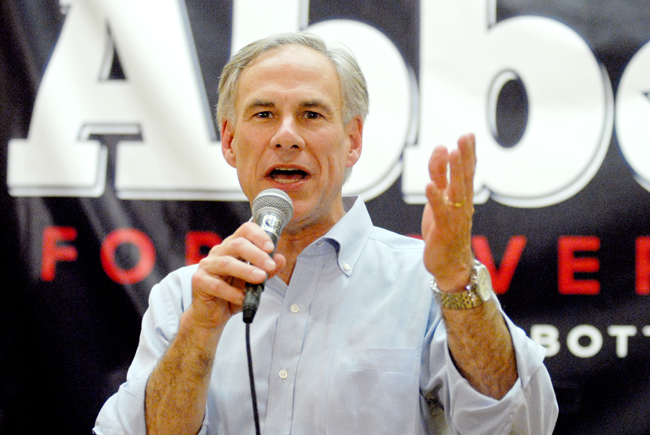On Nov. 12, Attorney General Greg Abbott gave his second policy speech since filing his candidacy for governor. The 25-minute-long speech, one of his most detailed yet, received a standing ovation from its audience: the Northeast Tarrant Tea Party, according to the Texas Tribune. But Texans concerned about the future of our state should be wary.
The issues Abbott discussed included privacy rights, guns and the Affordable Care Act. And while some of the topics he spoke on were reasonable fare — such as ethics proposals regarding limiting last-minute campaign contributions, for which we gave Abbott a Horns Up in last week’s Texan — others seemed obscure and almost ridiculous. Take Abbott’s stance on the cameras mounted on traffic lights: Abbott took the time last Tuesday to say he would push for a state law to allow voters to repeal local red light camera ordinances. Though for some Libertarians, red-light cameras may be an infringement of personal liberty, in a statewide election, is time really best spent talking about something as petty as removing traffic cameras?
Also concerning: Abbott’s support for allowing Texans to carry guns on college campuses. The right to allow concealed carry on college campuses has been a much-debated topic in the past year, but college presidents nationwide have been against allowing guns on campus. More than 340 college presidents have signed an open letter to the nation’s policy leaders opposing concealed weapons on campus — including five presidents from colleges in Texas. UT-Austin was not among them. Austin Police Chief Art Acevedo even testified against having guns on campus in a Texas House Homeland Security and Public Safety hearing in March of 2011.
More frustrating than Abbott’s stance on concealed carry is that all he saw fit to say on higher education policy during his time at the mic related more to gun rights than issues actually affecting students. Abbott’s too smart to believe that the only issue facing Texas Universities is the ability to bring a gun on campus, so why did he choose to not make mention of rising tuition or declining state funds?
Admittedly, it makes sense that Abbott chose to avoid talking about education in a policy address aimed at the notoriously spending-averse Tea Party. But so far, there is nothing to indicate that Abbott is the “new kind of Republican candidate … one that is very substantive, one that has a lot of policy details,” that he claimed to be during his comments.
Abbott has two other policy speeches left — one on education and another on border security. Given that he remains the frontrunner in the upcoming election, with an 8-point lead over his main opponent, Democrat Wendy Davis, according to a poll published Nov. 5 by Public Policy Polling, we hope Abbott takes the time to develop more substantial ideas on higher education policy before he next takes the stage, let alone the governor’s mansion.
















